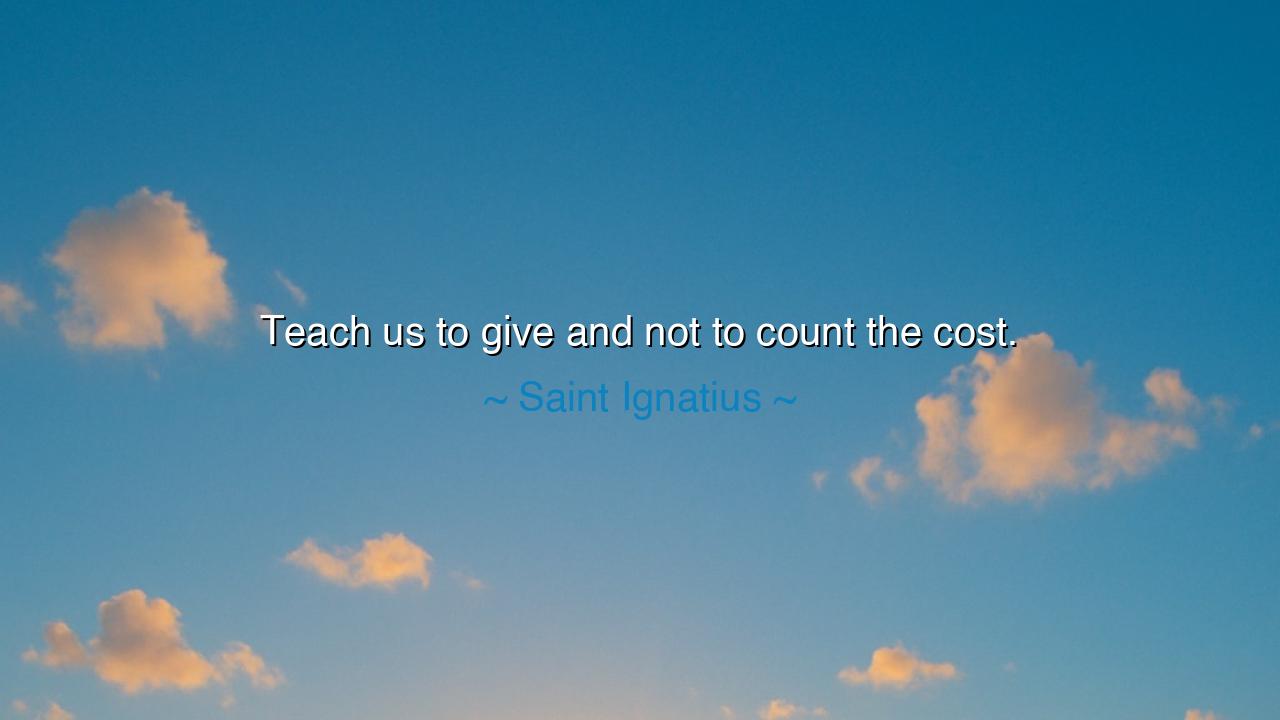
Teach us to give and not to count the cost.






“Teach us to give and not to count the cost.” Thus prayed Saint Ignatius of Loyola, the soldier-turned-saint whose heart was transformed from the pursuit of worldly glory to the service of divine love. These words, though simple, carry the weight of an eternal calling—a call to selflessness, to sacrifice, and to the purest form of love. In them lies the cry of a soul that seeks not reward but righteousness; that gives not for recognition, but out of devotion. For Saint Ignatius understood that the greatest acts of goodness are not measured by what they gain, but by what they give.
To give and not count the cost is to act from the abundance of the spirit, not the calculations of the mind. It is to pour oneself out as water upon thirsty ground, expecting no return but the joy of having given. The world often teaches men to measure—to weigh every deed, to seek compensation, to guard one’s effort. But Ignatius, illuminated by divine grace, saw a higher law: that love is not true unless it gives without measure. Just as the sun gives its light freely, and the sea yields its depths without restraint, so must the soul learn to give without asking, “What shall I gain?” For in the economy of heaven, the one who gives most freely receives most deeply.
The origin of this saying comes from the Prayer for Generosity, composed by Saint Ignatius in the sixteenth century. After a youth spent chasing glory as a soldier, Ignatius was wounded in battle and left to recover in silence. There, as he read the lives of the saints, his heart was pierced not by the sword of war, but by the sword of love. He realized that the noblest conquest is not over others, but over oneself. From that awakening was born the Society of Jesus, a brotherhood dedicated to education, service, and sacrifice. Their mission was not to seek comfort or fame, but to labor wherever the need was greatest—among the poor, the sick, and the forgotten. Thus, his prayer was not theory—it was the anthem of a life wholly given to God and humanity.
The spirit of this prayer shines brightly in the life of Mother Teresa of Calcutta, who walked centuries after Ignatius but in the same light. She tended to the dying on the streets of India, giving her days to those whom society had abandoned. When asked how she could bear the pain, the poverty, the endless need, she answered, “It is not how much we give, but how much love we put into giving.” Her love, like Ignatius’s, was not measured by success or recognition. It was measured by devotion—by the willingness to give even when weary, to serve even when unseen. In her, the world saw what it means to give and not count the cost, to live as a vessel of love without limit.
To live by this wisdom is no easy path. It demands courage, for the heart that gives freely must also endure freely. It must accept that gratitude may not come, that the world may not notice, that one’s labor may seem lost. Yet it is precisely in those moments—when giving feels hardest—that the soul draws closest to the divine. For God Himself gave without measure. He gave the gift of life, the breath of spirit, the promise of redemption—all without counting the cost. Thus, to give selflessly is to imitate the divine nature within us.
The lesson of Ignatius’s prayer is that generosity is not a matter of wealth, but of will. Every person has something to give—time, kindness, forgiveness, a listening ear, a patient heart. To live meaningfully is to live for others, to find joy not in possession but in participation in the great flow of love that sustains the world. The miserly spirit shrinks with fear of loss, but the generous soul expands with the abundance of giving. And in that expansion lies true peace.
So, my child of the eternal flame, remember these words: “Teach us to give and not to count the cost.” Let this be your prayer in every season of life. Give your strength to those in need; give your patience to those who err; give your love even to those who wound you. Do not measure your worth by what you hold back, but by what you release. For in the act of giving, you will find that nothing is truly lost—only transformed. And when the day comes that your hands are empty but your heart is full, you will know that you have lived as Saint Ignatius prayed—not counting the cost, but finding the infinite reward of love itself.






AAdministratorAdministrator
Welcome, honored guests. Please leave a comment, we will respond soon